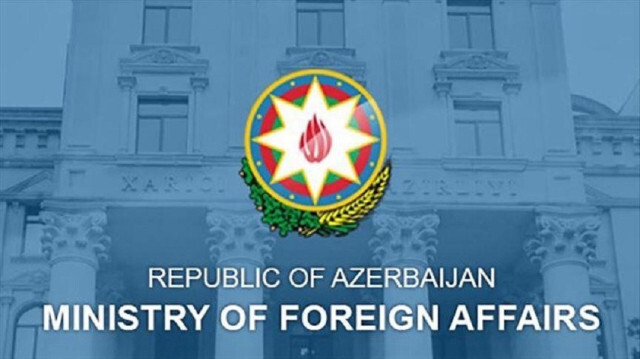
‘Armenia continues to hinder implementation, advancement of agenda agreed within framework of tripartite meeting,’ says Baku
Azerbaijan on Friday said that Armenia’s failure to adhere to the tripartite agreement reached with the EU in July concerning the delivery of goods to the Karabakh region hinders its implementation.
“Armenia's reneging on the agreement reached by putting forward illegal conditions and various excuses through the so-called regime hindered the implementation of the said agreement,” the Azerbaijani Foreign Ministry said in a statement, responding to an earlier statement by Ecaterina Casinge, the spokeswoman for European Council President Charles Michel.
The statement reiterated that representatives of Armenian residents in Karabakh refused to take part in a meeting scheduled for early August, despite a previous agreement reached during talks that involved Azerbaijan’s special representative on the matter.
“Unfortunately, from July 15 until today, Armenia and its so-called regime continue to hinder the implementation and advancement of this agenda agreed within the framework of the mentioned tripartite meeting, and nullify the efforts of the EU and other international partners in this direction,” the statement further said.
It also said that Baku offered peace to Armenia “on the basis of mutual recognition and respect of each other's sovereignty, territorial integrity and inviolability of borders by the two countries,” and that Azerbaijan is determined to reintegrate Armenian residents in Karabakh.
“In addition to demonstrating its commitment to all these directions, Azerbaijan also reserves the right to defend its sovereignty and territorial integrity by all legal means provided by the UN Charter and other universal documents of international law in the context of the ongoing military and political provocations of the Armenian side,” it added.
Casinge said that Michel proposed a plan for the “full-fledged operation” of the Lachin road and the opening of the Aghdam-Khankendi road, as well as called for dialogue between Azerbaijan and Armenian residents in Karabakh.
Relations between Azerbaijan and Armenia have been tense since 1991 when the Armenian military occupied Nagorno-Karabakh, a territory internationally recognized as part of Azerbaijan, and seven adjacent regions.
In the fall of 2020, Azerbaijan liberated several cities, villages, and settlements from Armenian occupation during 44 days of clashes. The war ended with a Russia-brokered peace agreement.
Despite ongoing talks over a long-term peace agreement, tensions between Azerbaijan and Armenia rose in recent months over the Lachin road, the only land route giving Armenia access to the Karabakh region, where Azerbaijan established a border checkpoint in April on the grounds of preventing the illegal transport of military arms and equipment to the region.
Since then, Yerevan has accused Azerbaijan of causing a “humanitarian crisis” in the region. Baku has vehemently denied Armenia’s claims and has proposed the use of the Aghdam-Khankendi road for shipments to the region.

